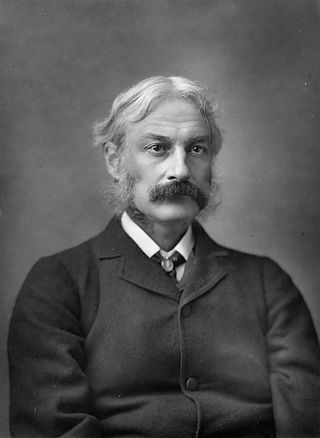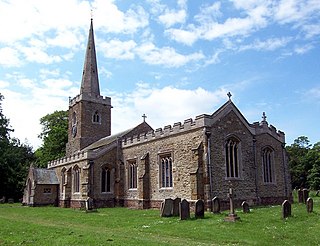
Andrew Lang was a Scottish poet, novelist, literary critic, and contributor to the field of anthropology. He is best known as a collector of folk and fairy tales. The Andrew Lang lectures at the University of St Andrews are named after him.

Beachampton is a village and civil parish beside the River Great Ouse in the unitary authority area of Buckinghamshire, England. The village is about 5 miles (8.0 km) east of Buckingham and a similar distance west of Milton Keynes.

Edward Verrall Lucas, CH was an English humorist, essayist, playwright, biographer, publisher, poet, novelist, short story writer and editor.

Freiston is a village and civil parish in Lincolnshire, England. The population of the civil parish at the 2011 census was 1,306. It is situated approximately 2 miles (3 km) east from Boston. The Greenwich Prime Zero meridian line passes between the village and Hobhole Drain.

Stockerston is a village and civil parish in the Harborough district of Leicestershire, England, located on the border with Rutland, by the Eye Brook. According to the 2001 census the parish had a population of 35. The population remained less than 100 at the 2011 census and is included in the civil parish of Horninghold.
Bernard Edward Joseph Capes was an English author.
Mary Elizabeth Mann, née Rackham, was a celebrated English novelist in the 1890s and early 1900s. She also wrote short stories, primarily on themes of poverty and rural English life. As an author she was commonly known as Mary E. Mann.
James Charles Wall (1860–1943) was a British ecclesiologist, historian, and Fellow of the Royal Historical Society in the late 19th and early 20th century. He wrote many books, mainly on Church history, and was an early contributor to the Victoria History of the Counties of England project. He was born in Shoreditch on 15 July 1860 to James Wall and Mary Wall née Williams. He attended Westminster School and New College, Oxford.

Edmund Hort New was an English artist, member of the Birmingham Group, and leading illustrator of his day.

Charles George Harper (1863–1943) was an English author and illustrator. Born in London, England, Harper wrote self-illustrated travel books, including those exploring the regions, roads, coastlines, literary connections, and old inns of Britain. In later life, he lived in Petersham.

Nathaniel Hubert John WestlakeFSA (1833–1921) was a 19th-century British artist specialising in stained glass.
Rev. Peter Hampson Ditchfield, FSA was a Church of England priest, historian and prolific author. He is notable for having co-edited three Berkshire volumes of the Victoria County History which were published between 1907 and 1924.

Hainton is a village and civil parish in the East Lindsey district of Lincolnshire, England. It is situated on the A157 road, 10 miles (16 km) west from Louth and 5 miles (8 km) south-east from Market Rasen.

Waithe is a hamlet and civil parish in the East Lindsey district of Lincolnshire, England. It is on the A16, 1 mile (1.6 km) south from Holton-le-Clay and 1 mile (1.6 km) north from North Thoresby.
John Charles Cox was an English cleric, activist and local historian.

The Monastery of Ennisnag was an early Irish Christian monastery, and later a medieval prebendal church, located at Ennisnag, in County Kilkenny, Ireland. The medieval monastery and church are no longer extant. From the ruins, St Peter's church, of Protestant denomination, was established in the early 19th century.

Katherine of Ledbury was a Gloucestershire-born noblewoman of the 13th century who became an anchoress in Ledbury, Herefordshire. Although never officially canonized, Katherine was the subject of William Wordsworth's sonnet, “St. Catherine of Ledbury,” and is remembered as a patron saint of that town. She has often been confused with the 4th century martyr Catherine of Alexandria, whose cult in Ledbury preexisted hers.

Allan Fea, was a British historian, specializing in the English Civil Wars period and the House of Stuart, and an antiquary, after a first career as a clerk at the Bank of England.

Rotha Mary Clay was a British self-taught historian and social worker.

Edwin J. Lewis Jr. was an American architect who designed numerous residential houses and churches in New England.